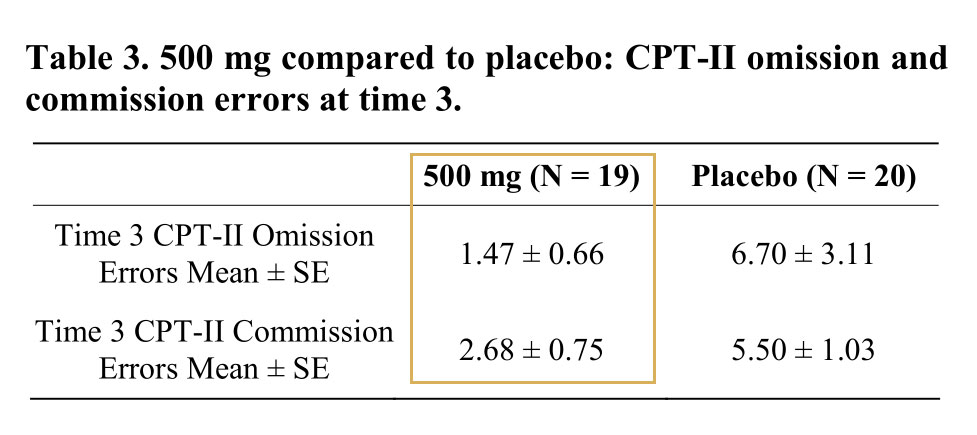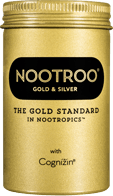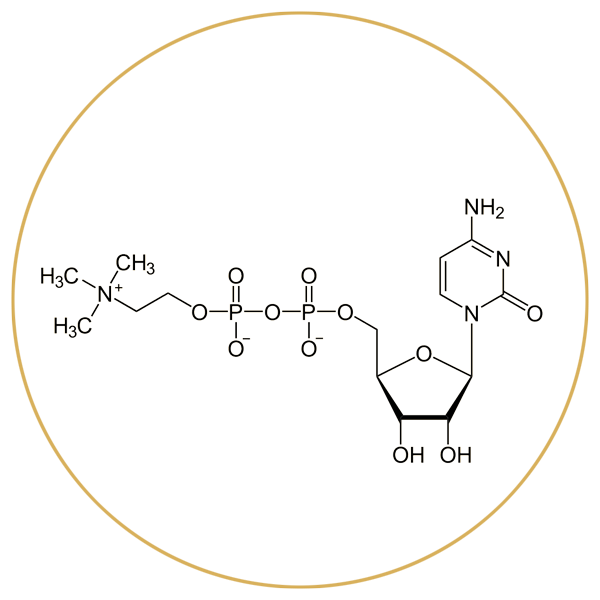
CDP-Choline
CDP-Choline, also known as citicoline, is an essential nutrient that is crucial in the brain’s processes of memory formation, attention and learning, yet most people are deficient in it. CDP-Choline is normally obtained by the body from food and supplies choline for the brain to make the neurotransmitter acetylcholine as well as neuronal cell membranes. Studies in adults show that supplementation of citicoline for 28 days, at levels found in Nootroo Gold & Silver, has been shown to improve verbal attention, and much more. Further, the mixing of a choline source like citicoline, combined with a nootropic like noopept or phenylpiracetam, have been shown to have “profound effects.” The recommendations for adults is between 450-550 mg per day, both Nootroo Gold & Silver have approximately 500 mg of the purest form of CDP-Choline available, Cognizin branded CDP-Choline. It is made in an enzymatic process in a bioreactor that takes 6 months and is imported from Japan. This patented-form of CDP-Choline is the only form that is bioidentical to the form found in nature, in a free-base and not a salt. The amount of choline in Nootroo G&S is comparable to the quantity found in eating 4 large eggs per day.
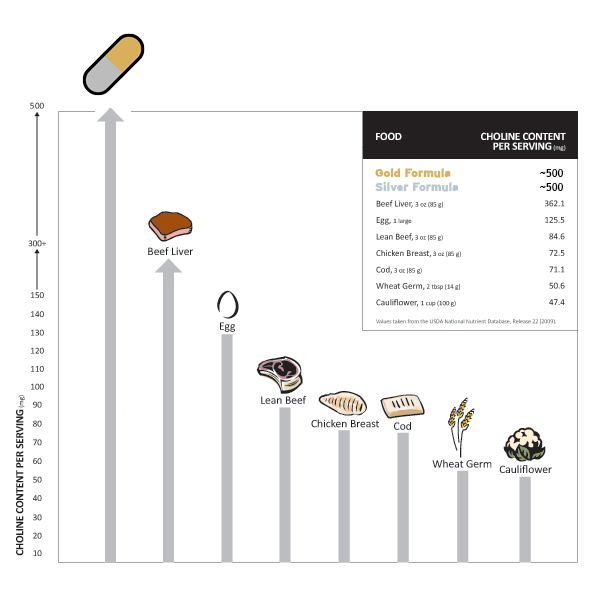 Citicoline History & Basic Actions
Citicoline History & Basic Actions
First synthesized in 1956, citicoline has been studied in Europe, Japan and the US for several decades. It is an essential in the intermediate synthesis of cell membrane structural phospholipids and is the rate-limiting step in phosphatidylcholine synthesis. Choline is part of the diet and is produced in the brain in small amounts. Due to the low production in the brain, it is considered an essential nutrient. When it is administered orally, in the intestinal tract and in circulation, goes on to rapidly form choline and cytidine, which are used to generate phospholipids. This form of choline is used preferentially in the synthesis of acetylcholine. Citicoline’s therapeutic effects stem from its ability to:
- Increase phosphatidylcholine synthesis, the primary component of neuronal membranes
- Enhance acetylcholine synthesis
- Promote the synthesis of several other membrane phospholipids, which leads to repair and regeneration of synapses
- Prevent the accumulation of free fatty acids and free radicals in strokes.
Citicoline is also known as CDP-Choline (cytidine diphosphate) is the form of choline that is found in food. And while it is found in food, it is hard to adequate levels, as a remarkable 89% of American adults are deficient in choline.[1]Suboptimal intakes of choline are prevalent across many life-stage subpopulations in the United States. Only 10.8 ± 0.6% of 2009-2012 NHANES participants aged ≥ 2 years (15.6 ± 0.8% of males and … Continue reading. Eggs are a great source of choline, but after that, to get the same level of choline found in Nootroo G&S, you would have to eat over a pound of turkey gizzard. When was the last time you ate turkey gizzard?
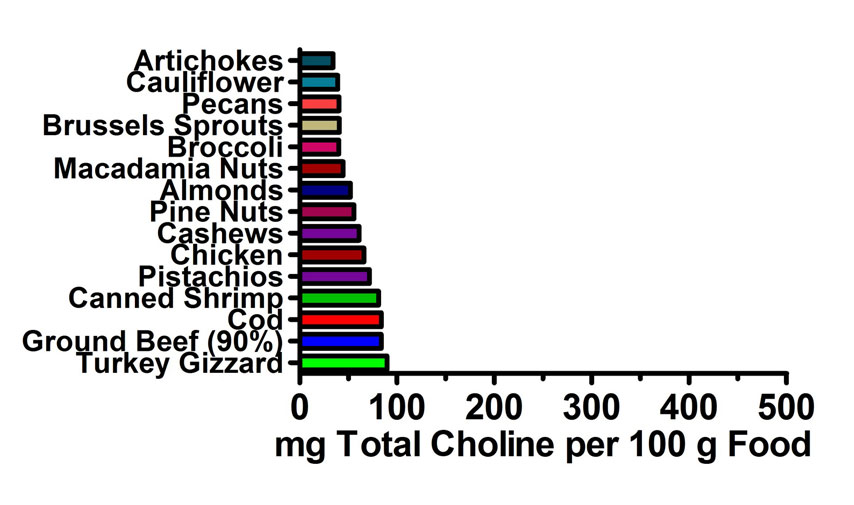
This means that if you are deficient your body is not only not producing its maximum amount of acetylcholine and all the other inputs, it is actually likely catabolizing (breaking down) existing brain phospholipids to utilize their materials in the synthesise of new neurons and cells. So increasing levels of citicoline actually protects the brain from this process and other enzymes involved in brain energy metabolism.[2]Henneberry AL, Wright MM, McMaster CR. The major sites of cellular phospholipid synthesis and molecular determinants of Fatty Acid and lipid head group specificity. Mol Biol Cell. 2002; 13: 3148-3161.[3]Secades JJ, Lorenzo JL. Citicoline: pharmacological and clinical review. Clin Pharmacol. 2006; 28: 1-56.[4]Jambou R, El-Assaad F, Combes V, Grau GE. Citicoline (CDP-choline): What role in the treatment of complications of infectious diseases. Int J Biochem Cell Biol. 2009; 41: 1467-1470. Further, its not just that your body will be protected from destroying its own cells to get free their materials for use, but by providing additional choline, the body will actually increase its synthesis of additional cells up to a certain point.[5]Precursor control of neurotransmitter synthesis. This process is constantly going on in the body as phospholipids are essential constituents of cells and have a high turn over rate, which requires a continuous synthesis of those molecules to make sure cells can function properly. [6]Kennedy EP, Weiss SB. The function of cytidine coenzymes in the biosynthesis of phospholipides. J Biol Chem. 1956; 222: 193-214.[7]Chida N, Shimizu Y. Biosynthesis of myelin lipids of cultured nervous tissues–incorporation of choline and CDP-choline into myelin phospholipids. Tohoku J Exp Med. 1973; 111: 41-49. So even though it is extremely important for the brain’s development, cell signaling, nerve impulse transmission, and metabolism, most people are not receiving adequate supplies. Nootroo however has over 500 mg of citicoline.
Citicoline Metabolism
Administration of a dose of 300 mg in healthy adults showed nearly 99% absorption, with less than 1% excreted. A study using a radioactively dyed version of CDP-Choline found that 62.8% ended up in brain tissue as phospholipids. Oral citicoline is hydrolyzed (broken down) in the intestinal tract and in circulation metabolizes rapidly. These parts (cytidine and choline) go on to provide the building material for many important processes as noted above. Some parts are even re-synthesized back into citicoline after crossing the blood-brain barrier, eventually turn into phosphatidylcholine. CDP-Choline plays essential roles in the human body from supporting the synthesis of betaine, a methyl donor (helps with methylation, which is essentially cell signalling) and the synthesis of acetylcholine, which is the main neurotransmitter associated with memory formation.
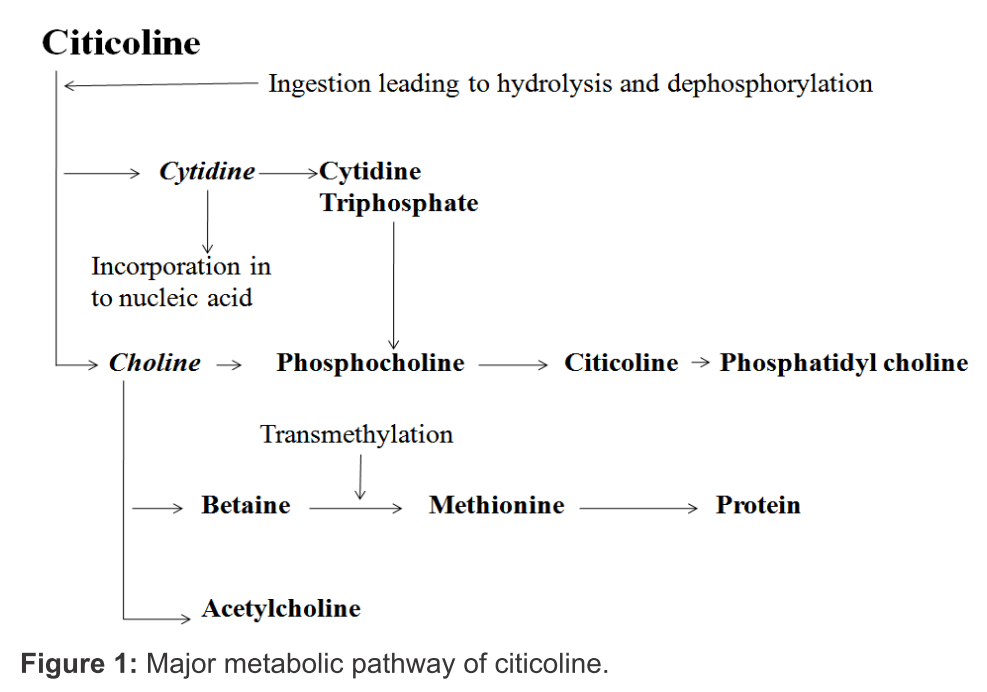
Citicoline on Healthy Adolescent Males
“Objective: This study assessed the effects of citicoline, a nutraceutical, on attention, psychomotor function, and impulsivity in healthy adolescent males”
“Results: Adolescent males receiving 28 days of Cognizin® citicoline showed improved attention and psychomotor speed and reduced impulsivity compared to adolescent males who received
placebo
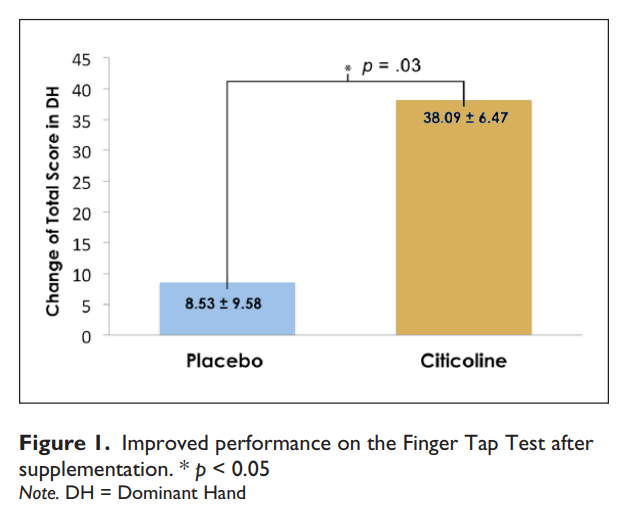
Citicoline on Healthy Adult Women
Objectives: “The present study assessed the potential cognitive-enhancing effects of citicoline, a dietary supplement, in healthy adult women. Specifically, it was hypothesized that citicoline supplementation would be associated with improved attention compared to placebo. ”
Conclusion: “After 28 days of daily citicoline supplementation, participants who were administered either the 250 mg or the 500 mg citicoline doses showed significantly better ability to produce correct responses on the CPT-II, likely due to improved cognitive inhibition. Our findings suggest that citicoline may improve attentional performance in middle-aged women and may ameliorate attentional deficits associated with central nervous system disorders.”
Citicoline as a limiting factor for synthesis of new phospholipids in healthy older adults
Abstract “Rationale: Phosphatidylcholine (PtdCho) in brain cell membranes decreases with age. Evidence from both animal and in vitro studies indicates that CDP-choline (citicoline) administration may increase phosphatidylcholine (PtdCho) synthesis and might reverse PtdCho loss.”
Conclusions: “The increases in phosphodiesters seen in this study indicate that phospholipid synthesis and turnover were stimulated by 6 weeks of oral citicoline. These results in humans support previous in vitro and animal studies and suggest that the administration of oral citicoline may be of use in reversing age-related changes in the brain.”
Discussion: “A decline in learning and memory is commonly observed with normal aging, and has been hypothesized to be linked with changes in brain cholinergic mechanisms (Bartus et al. 1982). A recent comprehensive review concluded that citicoline does have a beneficial effect on memory function (Fioravanti and Yanagi 2000), probably by providing precursors to promote the synthesis of both ACh and membrane phospholipids (Secades and Frontera 1995). This study provides the first in vivo data in humans to support the many in vitro and animal studies showing increased PtdCho synthesis as a consequence of citicoline administration. The correlation between increased PDE concentrations and improved verbal learning in healthy older subjects suggests that the administration of oral citicoline may be of use in reversing age-related cognitive changes.”
From: “Chronic citicoline increases phosphodiesters in the brains of healthy older subjects: an in vivo phosphorus magnetic resonance spectroscopy study”[8]https://www.ncbi.nlm.nih.gov/pubmed/12021827
Increase in Brain Bioenergetics
From: “Citicoline enhances frontal lobe bioenergetics as measured by phosphorus magnetic resonance spectroscopy”:
“In conclusion, this study shows that significant neurometabolic and neurophysiological alterations, i.e. improved frontal lobe bioenergetics and phospholipid membrane turnover, are observed in healthy adults who receive citicoline supplementation for 6 weeks. Furthermore, citicoline-related alterations in brain neurochemistry were regionally specific, targeting a frontal brain region (ACC) implicated in a variety of cognitive functions, including attention and memory. Taken together, these results suggest that citicoline supplementation may mitigate cognitive declines associated with aging by increasing energy reserves and utilization, and by increasing the amount of essential structural components needed to synthesize and maintain cell membranes.
Citicoline Increases Levels of Other Neurotransmitters
Citicoline has been shown to increase biogenic monoamine levels of dopamine, noradrenaline, and serotonin within the central nervous system. [9]CHANGES IN BRAIN BIOGENIC MONOAMINES INDUCED BY THE NOOTROPIC DRUGS ADAFENOXATE AND MECLOFENOXATE AND BY CITICHOLINE (EXPERIMENTS ON RATS
Why Cognizin Brand (and Nootroo Brand) Makes a Difference
Cognizin is the patented form of the molecule CDP-Choline and is the only version in the world that is in the “free base” form that is bioidentical to the molecule as it is found in nature and synthesized the body. All other forms sold as CDP-choline are actually are actually a synthetically made form that is a salt, known as citicoline sodium. Cognizin brand citicoline is made in a fermentation process that takes 6 months and yields citicoline as manufactured by cells. Nootroo always uses the best inputs, even if they cost significantly more. We never cut corners and are always are looking to make the best product possible. In fact, the reason the formula is called the Nootroo Gold is that before we had enough scale to manufacture our own non-artificially colored capsules that we now use, we used actual edible 23.5k gold flakes inside the Gold Formula and 100% silver flakes inside the Silver Formula. That mentality of never cutting corners persists today and is the reason we are still known as The Gold Standard In Nootropics™.
References
| ↑1 | Suboptimal intakes of choline are prevalent across many life-stage subpopulations in the United States. Only 10.8 ± 0.6% of 2009-2012 NHANES participants aged ≥ 2 years (15.6 ± 0.8% of males and 6.1 ± 0.6% of females) achieved the adequate intake (AI) for choline. Assessment of Total Choline Intakes in the United States |
|---|---|
| ↑2 | Henneberry AL, Wright MM, McMaster CR. The major sites of cellular phospholipid synthesis and molecular determinants of Fatty Acid and lipid head group specificity. Mol Biol Cell. 2002; 13: 3148-3161. |
| ↑3 | Secades JJ, Lorenzo JL. Citicoline: pharmacological and clinical review. Clin Pharmacol. 2006; 28: 1-56. |
| ↑4 | Jambou R, El-Assaad F, Combes V, Grau GE. Citicoline (CDP-choline): What role in the treatment of complications of infectious diseases. Int J Biochem Cell Biol. 2009; 41: 1467-1470. |
| ↑5 | Precursor control of neurotransmitter synthesis. |
| ↑6 | Kennedy EP, Weiss SB. The function of cytidine coenzymes in the biosynthesis of phospholipides. J Biol Chem. 1956; 222: 193-214. |
| ↑7 | Chida N, Shimizu Y. Biosynthesis of myelin lipids of cultured nervous tissues–incorporation of choline and CDP-choline into myelin phospholipids. Tohoku J Exp Med. 1973; 111: 41-49. |
| ↑8 | https://www.ncbi.nlm.nih.gov/pubmed/12021827 |
| ↑9 | CHANGES IN BRAIN BIOGENIC MONOAMINES INDUCED BY THE NOOTROPIC DRUGS ADAFENOXATE AND MECLOFENOXATE AND BY CITICHOLINE (EXPERIMENTS ON RATS |
